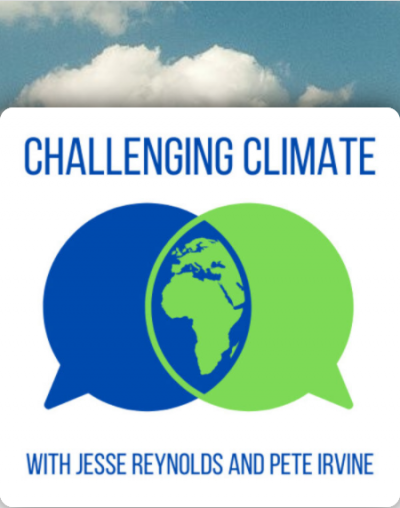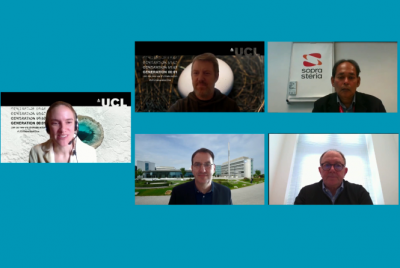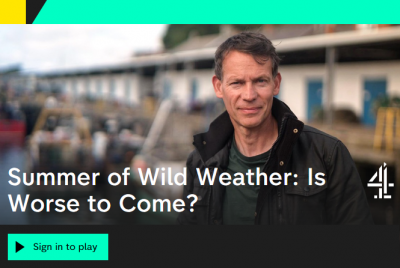Podcasts and Videos
Discover our podcasts and past event videos below... and click here for forthcoming events.
Featured
Generation One: The Climate Podcast
Back for Season Five!
Join our podcast hosts and world leading climate experts from UCL, Mark Maslin and Simon Chin-Yee for our fourth series, which tackles the biggest challenges facing the climate crisis, together with expert guests and questions from the public.
Make sure you subscribe wherever you listen to your podcasts.
Unlocking the SDGs: A blueprint for the future
In this dedicated podcast, we bring together experts from across UCL and beyond to explore the UN Sustainable Development Goals (SDGs).
Co-hosted by Professor Monica Lakhanpaul, (UCL Great Ormond Street Institute of Child Health) and Dr Priti Parikh (Bartlett School of Sustainable Construction), the podcast explores a new theme each episode – from climate to Covid.
 Could coal shut-down mark new era for energy?
Could coal shut-down mark new era for energy?

In this BBC4 Inside Science podcast, Prof Paul Ekins OBE, Professor of Resources and Environmental Policy and Director of the UCL Institute for Sustainable Resources, contributes to the debate on green energy.
The UK’s last coal-fired power station has closed, ending Britain's 142-year reliance on coal. But what difference will the closure of Ratcliffe-on-Soar make – and could it mark a new dawn for clean energy?
 Challenging Climate
Challenging Climate

Asking tough questions about the science, technology, and politics of climate change, two UCL climate researchers challenge leading experts on one of the defining issues of our age. Every two weeks, they explore how we can fight global warming by cutting greenhouse gas emissions, carbon removal, adaptation and solar geoengineering. Go to challengingclimate.org
Lunch Hour Lecture: How to save our planet
Everyone agrees we must keep global warming to under 2˚C, and under 1.5˚C if possible. But how can we do this while dealing with the other great challenges of our age: global poverty, population growth, environmental degradation and global security. UCL Professor Mark Maslin shows us how we can save our Planet from climate change while improving everyone’s lives. (Also available as a video)
Climate, Disasters and Health
In this episode of the Disruptive Voices podcast series, UCL Grand Challenges speak to Dr Marina Romanello and Professor Ilan Kelman, about climate change as a health disaster. They discuss how to better measure the impact of climate change on health, and crucially, how to protect the most vulnerable from its negative effects.
Climate Change and Health: Exploring Co-benefits of Climate Actions
In the run up to COP26, as part of The Bartlett's Together for Climate Action campaign, Dr Harry Kennard discusses the co-benefits of climate mitigation actions for health with academics and scientists from UCL and beyond. Each episode focuses on one of the may ways climate change and health are related, with an interview with an expert in the field.
Together Towards Net Zero
In this new series, we're focusing on stories from our Net Zero Innovation Programme to help shine a light on how councils and universities can work together to co-create solutions to meet council's climate commitments. Each podcast brings together participants with expertise on the topic to explore the opportunities and challenges of the programme together.
What does climate change have to do with public health?
In this first episode of the 'UCL Public Health Disrupted' series, Dominique Palmer - dedicated climate activist, organiser within the UK Student Climate Network and one of Forbes 100 Top UK Environmentalists - and Prof Paul Ekins OBE, Professor of Resources and Environmental Policy and Director of the UCL Institute for Sustainable Resources, explore how the climate is disrupting public health.
Coronavirus: The Whole Story - Could COVID-19 save the planet?
Exploring the role COVID-19 has played in the climate crisis played in the climate crisis. As things have changed, traffic has gone down in cities, people are realising what clean air really feels like. But the short term gains on the environment are matched by the explosion of PPE - and when abandoned on the streets, can choke wildlife the same way plastics do.
Hypot-enthuse: Professor Julienne Stroeve on climate change research in the Arctic
In this episode of Hypot-enthuse, our hosts speak to UCL Earth Scientist Professor Julienne Stroeve about her research on sea ice, her time spent in the Arctic, and her perspective on climate change. Hypot-enthuse is a podcast from the Faculty of Mathematical & Physical Sciences at UCL. Each episode features a light-hearted chat with a notable academic, and will examine exciting science topics making news around the world.

Promoting action and change during COP26
UCL worked in collaboration with One Carbon World, Sopra Steria and the United Nations Climate Neutral Now initiative to address the following Climate related issues:
How can your business save our planet?
Climate science-based targets and what does it mean for your organisation?
Sport changing our world for the better
Climate heroes - agriculture and horticulture
How can global fashion save our planet?
Climate Leaders: Chris Rapley CBE

Summer of wild weather: Is worse to come?
Summer 2021 has seen record-breaking temperatures, wildfires, torrential rain and fatal floods. What's causing such extreme weather? And is the UK ready for climate change? UCL's Professor Chris Rapley CBE contributes to this Channel 4's documentary.
Earth, but not as we know it: Lovelock’s legacy and our future
This Manchester Science Museum Group virtual event took place on Saturday 13 February. Hear our expert panel respond to a special recording from James Lovelock, the 101-year-old scientist who created the Gaia Hypothesis, with their own thoughts on humanity’s relationship with the Earth and the future of our planet. Helen Czersky (UCL) leads the discussion with expert panellists, including science writer and broadcaster Gaia Vince, climate activist (UCL) Professor Chris Rapley, CBE (UCL), and Zamzam Ibrahim, Vice President of European students Union.
Climate action and sustainable development: Synergies and trade-offs
Presentation by Professor Chris (UCL) Rapley Chaired by Professor David Viner: With the 17 SDGs comprising 169 targets and the 164 NDCs covering more than 7000 actions, the integration into national policies, strategies and planning, in a coherent and synergistic manner, is a monumental challenge. Analysis by the International Council for Science (ICSU) and a tool created by the Stockholm Environment Institute (SEI) provide insights into the myriad interconnections between the SDG targets and NDC actions, and reveal synergies and conflict/trade-offs, some of the latter occurring even within the SDGs. More info on the talk
Behaviour: The Climate & Sustainability Crises
Session 7 of UCL’s Beyond Boundaries - Realising the UN Sustainable Development Goals: Human behaviour lies at the heart of the causes of the environmental degradation and climate change that has led to the current crisis. This panel discussion considered the contribution of behavioural & social sciences to addressing the climate & sustainability crises facing the world, and demonstrated the contribution of inter-disciplinary and international collaborations in bringing new perspectives, research and translational methods and knowledge.
The loss of bumblebees – why is it happening and why is it important?
Part of the Lunch Hour Lectures series: The use of ‘big data’ has shown that bumblebee losses are linked to both climate change and habitat loss. Predictions for the future paint a worrying picture for bumblebees. We have also been exploring what the changes mean for pollination of important human food crops. Also available as a podcast.
Insights from COVID 19 useful for the UK’s energy transition to net zero
Part of the Lunch Hour Lectures series: The COVID-19 epidemic has led to tumultuous disruptions in economy, politics, and society. The UK is also facing the huge challenge of achieving net zero GHG emissions by 2050. This talk presented a theory on how these two challenges compare, including the roles of technology transition, political capital and public cooperation; and five propositions on how insights about the COVID-19 crisis could be used to improve energy transition strategy for the coming 30 years.
Our Planet, Our Health
Part of the Lunch Hour Lectures series: Today we live longer and more prosperous lives than ever before, as a species, we have made huge advances to create conditions for better health for billions of people, however, this progress is taking a heavy toll on the planet's natural systems. This talk explores the links and interdependencies between our health and the health of our planet with particular reference to understanding how rapid global environmental change impacts the emergence and spread of high impact infectious diseases like COVID-19, Ebola or SARS.
Earth Observation for Planning Sustainable Cities
Part of the Lunch Hour Lectures series: Urban areas are expected to triple by 2030 to accommodate 60% of the global population. This lecture presents a data-driven planning process for urban monitoring and heat mitigation that will enhance the future sustainability of our cities to align with current global development agendas.
Internet of Wild Things-using technology to understand and safeguard our planet
Part of the Lunch Hour Lectures series: Wild nature and natural ecosystems are declining rapidly as humans use more of the earth’s resources and change climate patterns. This lecture presents some of the latest technological advances in sensing, analysing, monitoring, and responding to wildlife population declines, and argues that although these technologies will help us to better understand the natural world and to further engage people with their environment, these could be disruptive and we discuss whether we are really ready for the Internet of Wild Things! Also available as a podcast.
The Psychology of Climate Inaction
Part of the Lunch Hour Lectures series: If an asteroid were predicted to impact the Earth 50 years hence then our entire focus would be on deflecting it. We are, however, strangely inactive about the ecological crisis, even though it severely shortens the life expectancy of our own children. Why is this? This talk explores the psychology of climate inaction, taking both an individual and a societal perspective and exploring whether we can overcome it before it’s too late. Also available as a podcast.
 Close
Close

